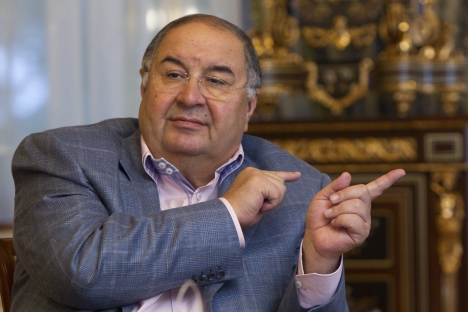
Alisher Usmanov, co-owner of Megafon (Russia’s 2nd largest cell phone provider) has an estimated fortune of $18.1 billion, according to Forbes. Source: Reuters / Vostock-Photo
As a slew of companies dust off plans for listings, investors will be keeping an eye out for the next big sale, from No. 2 mobile operator Megafon, to gauge the appetite for Russian risk.
The roadshow for Megafon’s London listing hit a slight hiccup earlier this month after one of the banks involved in the sale, Goldman Sachs, pulled out over corporate governance concerns. The U.S. bank cited recent comments by Megafon’s majority shareholder, Alisher Usmanov, to Reuters that he intended to consolidate his assets into a single holding.
In another sign that investor appetite for Russian IPOs may be mixed, MD Medical Group, a leading Russia chain of private health clinics specializing in reproductive services and maternity care, held a successful $311 million IPO, while leading commercial bank Promsvyazbank delayed its listing plans, citing current market conditions.
Moscow-based analysts are confident, however, that the resilient consumer growth story underpinning the Megafon listing, currently underwritten by Morgan Stanley, Sberbank CIB, Citi, Credit Suisse and VTB, Russia’s second-biggest bank, means the IPO pipeline is still very much on track.
“Megafon could be more attractive than its rivals MTS and Vimpelcom, as it leads in the promising mobile data segment and has the most clear geographic focus” of the Russian mobile firms, said Konstantin Chernyshev, a telecoms analyst at Moscow-based Uralsib. “Megafon’s solid cash flows should also make it a strong dividend play, which have proven to be popular stocks amongst investors this year.”
The attempted flotation will be closely watched to see if there is enough demand to get more Russian company names listed internationally. Megafon aims to list in London and raise up to $3 billion from the sale of a 20 percent stake.
Usmanov, who made his first fortune in metals and mining, is well-known in Russia for his canny ability to think outside the box when it comes to investment opportunities. He became Russia’s richest man in 2011 after making well-timed investments in Internet stocks such as Facebook, and in April 2012 completed the purchase of a majority stake in Megafon.
In his Reuters interview, Usmanov attributed his success to investing smartly: “Buy low, but not at the bottom, and sell high but not at the top, to leave some profit to others.”
Buying into Sberbank, a top Russian blue chip, was a no-brainer for many investors with exposure to emerging markets, but Megafon may only appeal to investors specifically interested in the Russian investment story and the risks that go with it.
Russian stocks have not been popular over the last four years, and trade at a significant discount to their emerging market peers. IPOs have been few and far between. There were only three listings in 2009 in the aftermath of the global meltdown, but things picked up in 2010 with 12 IPOs, including aluminum producer RusAl in Hong Kong and e-mail service Mail.ru in London.
Hopes were higher in 2011 with some $30 billion worth of IPOs planned. However, as fears of a second global recession mounted, only 10 companies actually made it to market. Search engine Yandex led the way, raising $1.3 billion on the NASDAQ, followed by mid-sized commercial bank Nomos, which netted $718 million in London.
This year had been even slower, with only one successful IPO before Sberbank’s listing: RusPetro, an oil explorer with assets in western Siberia, raised $250 million in London in January.
Within weeks of Sberbank’s placement, MD Medical Group (MDMG) and Promsvyazbank (PSB) announced plans to list in London.
Following the announcement of MDMG’s London placement, the company said its market capitalization would be about $900 million after the IPO, with its free float expected to be at around 35 percent.
Dr. Mark Kurtser, chairman of MDMG’s board and the driving force behind the group, said in a statement after the listing that the company was “delighted with the positive response to our IPO, which highlights strong investor appetite for industry-leading businesses in growing markets.
“Supported by the London listing, we are well placed to capitalize on opportunities to develop our network of healthcare centres and selectively enhance our service offering in Moscow and other economically attractive regions of Russia.”
MDMG operates 11 clinics and hospitals in Russia, including the country’s largest private hospital, and one in Ukraine. The company caters to growing middle-class demands for modern treatment, more comfort and service during childbirth.
Ahead of the listing, Kurtser said that he expected the group to grow by 35-45 percent a year.
Meanwhile, Promsvyazbank (PSB) pulled its plans to list 20 percent of its shares, citing disappointing offers for its global depositary receipts, which had been priced at $10 and $12 per GDR.
But the bank said it had received expressions of interest from investors wanting to buy shares privately “outside the scope of a capital-markets transaction.”
PSB specializes in corporate banking for mid-sized Russian companies, trade finance and factoring. After the 2008 crisis, the bank also got into retail banking and last year had the country’s fastest-growing consumer lending business.
All rights reserved by Rossiyskaya Gazeta.
Subscribe
to our newsletter!
Get the week's best stories straight to your inbox